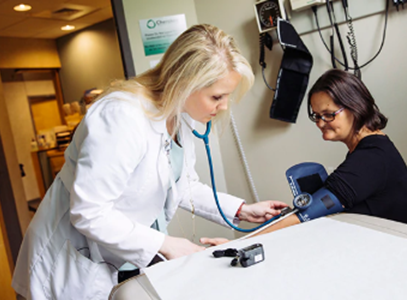
Community Health Centers: Providing a Lifeline of Care to Vulnerable Communities
Community health centers are on the front lines, every day, providing life-saving care to more than 27 million people in vulnerable rural and urban communities across the United States.
Without these community-based "family doctors," millions of uninsured and underinsured Americans would go without healthcare. They deliver a broad array of primary and preventive care services, ranging from medication therapy management to help patients better understand their medications, to the diagnosis and management of chronic diseases, such as diabetes, heart and lung disease, hypertension, depression and HIV/AIDS, among many other illnesses.
Community health centers also often offer a number of additional services—including transportation, translation, case management and health education—that help patients overcome barriers that can stand in the way of receiving the care they need.
The BD Helping Build Healthy Communities Program aims to strengthen the capacity of community health centers to provide care to vulnerable patients, through targeted grants.
The program was launched in 2013, via a partnership between BD, Direct Relief and the National Association of Community Health Centers. Since its launch, BD has awarded more than $4.6 million in grants to 36 health centers that are implementing innovative, replicable approaches to disease management, while improving patient outcomes.
In celebration of National Health Center Week (August 13-19), BD is proud to share the stories of three inspiring community health centers, who have leveraged BD Helping Build Healthy Communities grant funding to expand their capacity to provide quality care to those who need it most in their communities. Check out these inspiring videos to learn more about the dedicated community health providers who are helping our nation's most vulnerable patients."
Cherokee Health Systems, Knoxville, Tenn.
When uninsured and underinsured patients live in remote rural areas, challenges including mental illness, poverty and lack of transportation can often stand in the way of accessing quality healthcare. That’s why Cherokee Health in Knoxville, Tenn., leveraged its BD Helping Build Healthy Communities grant funding to hire an additional pharmacist and support staff to deliver medication therapy management (MTM) services to help more than 85 new patients better understand their medications, and better manage hypertension and other health issues. The program leveraged an innovative telehealth technology to enable community care providers deliver personalized, 1:1 care to patients, virtually, without having to leave their homes.
Neighborhood Health Downtown Clinic—Nashville, Tenn.
Neighborhood Health Downtown Clinic in Nashville, Tenn., is considered by many to be “Nashville’s Family Doctor,” and serves a heavily homeless population of patients, the majority of whom are completely uninsured. Due to many of the challenges that result from homelessness, many of the clinic’s patients take average of 12 medications – often prescribed by multiple medical and behavioral health providers. Neighborhood Health utilized its BD Helping Build Healthy Community grant funding to expand a Medication Therapy Management program to help patients better understand how to comply with their medications. By integrating a pharmacist as part of each patient’s care delivery team, the program-which reached more than 190 patients in its first year—also helps patients avoid potential adverse events that often occur from incorrect medication use.
Community University Health Care Center, Minneapolis, MN
Community University Health Care Center (CUHCC) serves a particularly diverse patient population in Minneapolis – which represents 12 different racial and ethnic groups that span five continents. Its staff of community health providers deliver culturally sensitive care to thousands of uninsured patients each year. CUHCC used its BD Helping Build Healthy Community grant funding to enhance the Medication Therapy Management services it offers to patients with chronic medical conditions – especially those who also cope with co-occurring mental health and substance abuse diagnoses.
Subscribe to receive BD blog alerts